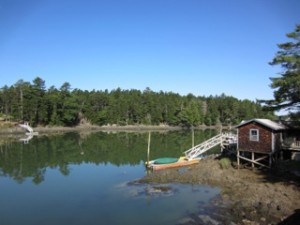As if you didn’t see that title coming (with apologies to The Police).
What got me thinking about synchronicity in my last post was the work I have been doing to prepare for my Fall semester courses. As it happens, I am teaching an upper-level English seminar entitled “Nuclear Nightmares: Storytelling After the A-Bomb” and a Freshman Honors seminar on sustainable environment (this year’s Honors topic). The Honors seminars are interdisciplinary, but each of us who teaches one does so through the lens of our own discipline.
I had not planned things this way, but as it turns out there are a lot of points of convergence between the two topics, so my research for one course complements my research for the other.
What strikes me over and over, as I read things as varied as Silent Spring and On the Beach and Welcome to the Greenhouse (a terrific Cli-Fi collection of stories) and A Short History of Nuclear Folly and Flight Behavior and Fail-Safe is that so much of what gets us, and by us I mean all of us, into trouble is hubris. This isn’t a word you hear a lot about today, but it is a theme that is both as old as human time and as current as the debate on climate change: We are masters and commanders of not only our own human domain but of the natural realm as well, and woe betide anyone who tries to point out that maybe we haven’t been the best stewards of our world(s).
Which brings me to what is going on here in Maine. It seems to me that when we picture climate change, we think about the Arctic and Antarctic. We can visualize ice shelves separating, icebergs calving, as the global temperature rises. We can look at NASA’s illustration of the melting polar ice cap and, while the thought of this occurring is intellectually upsetting, it doesn’t really hit home. I mean, not really hit home, not with the sort of sock-in-the-stomach realization that things are changing for the worse.
What does give us this type of shock? The kinds of stories that have been appearing this summer in our daily papers and our local broadcast news. And even more than that, the changes that we are observing all around us.
Maine puffins, already on fragile footing, are having trouble finding the small herring that they need to feed their chicks. Higher tides, warmer water, everything associated with climate change is making it harder for the puffins to survive. These slightly-goofy, comic birds are doing a little better this summer than last, but problems still loom as the global temperature continues to rise.
Even puffins, though, are relatively out of sight for most Mainers. Chickadees, however, are a different story. Even before this article appeared in the Bangor Daily News, it was very apparent to me that something was up with the chickadees, Maine’s state bird. Bold as brass, these little birds will sit on the feeder pole or wait at your feet as you change the birdseed. For many summers, when I would sit out on our deck the chickadees would be all around me, sometimes going so far as to sit on the back and arms of my chair. (This always made me feel a little like Disney’s Cinderella.) This year, I saw one or two chickadees in early June and haven’t seen another since.
And don’t get me started on the fireflies (nearly all gone), bees (disappearing fast) and bats (dying of white nose syndrome).
So here is my challenge, as I see it. I need to help my students find the connections between “big-picture” climate change and the small, everyday moments in their own lives. And the connections between what is happening half a world away in terms of nuclear arms development and the safety of all of us on the planet. One way to do this, I believe, is through literature, by reading stories that humanize the issues involved. Another way is through helping them find the synchronous moments in their own studies, in helping them make the connections between the hard sciences and their lives, between political science and what is happening in their own backyard. Most importantly, they need to come to recognize the ways in which hubris can not only lead to personal downfall (Macbeth, Dr. Frankenstein, Nebuchadnezzar) but, when played out on a larger scale, end up causing global disaster.
Will I be telling them the answers? No. I have my own opinions about what needs to be done to help stop climate change, to end nuclear proliferation, but my task is to allow my students to come to their own decisions about what is happening in (and to) the world and figure out their own responses to what they are learning about. For that, they will need everything a liberal arts education can provide (STEM courses, humanities courses, public discourse and private studies). What we can do, as teachers, is give them the best education, the best resources, the best skills, the best ammunition we can, then keep our fingers crossed that they go out and do a better job than what has been done by those who came before them. Our students, then, embody – both literally and figuratively – the best hope our planet has.
So I guess we now have our answer to what sort of job a humanities major can have: She can save the world.

